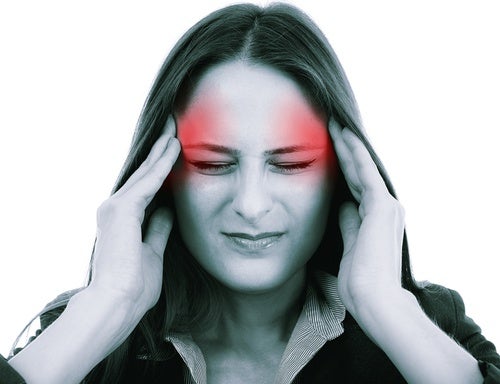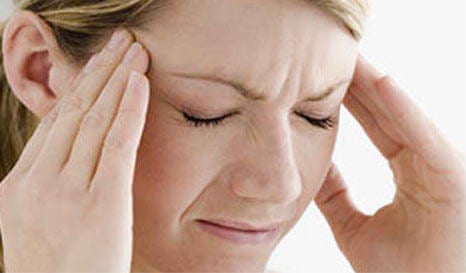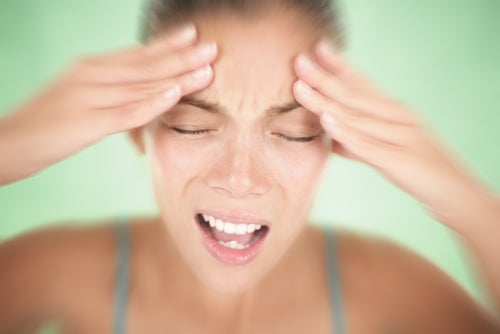
Headaches are one of the most common diseases, but thats no consolation when we have one. Stress causes many headaches and treatment, in general, is to take a couple of aspirin and relax. But sometimes headaches become chronic. As we will see in this article, your attempts to treat headaches sometimes can worsen. Often, our assessment of the cause of the headache is incorrect and this leads to corrective action that does not give us any relief. In this article, you will learn the 8 types of headaches and how to combat them.
1 sinusitis
While winter is finished, you have a wheezing, sneezing, and pressure in the nasal sinuses. In addition, you have watery eyes, runny nose and have a headache that apparently will not go until turn winter again.There is a chance that your sinuses are solely to blame your sore head. Headaches due to allergy and sinus are rarer than you think and we often diagnosed as headaches caused by other sources.
If your headache is related to sinusitis, don't bother treating it as another headache. In this case the treatment of the underlying cause is needed: your inflamed sinus cavities. You can remedy this by using a prescription antibiotic, a humidifier or saline nasal spray (only if a bacterial infection caused inflammation).
The same applies for any allergy-related headache, you must resolve the allergic reaction, remove the allergen itself and your headache will disappear, also.
2 headache

Even thinking about the name, gives headache. Headaches seem to spring from nowhere and cause excruciating pain, usually on one side of the head. Feel more intense around the central zone and create a disturbing feeling of pressure directly in the eye.
Cluster headaches are rare, and usually last for about an hour. A period of days, may be weeks or months during which there will be headaches. After a group of them, often suddenly disappear for months or even years.
Researchers are approaching the understanding of cluster headaches and know that the hypothalamus (the area of the brain that controls the autonomic nervous system and regulates hormones, sleep, libido, breathing and other automatic bodily processes) is activated when they occur, but they don't know why. When the hypothalamus acts during these episodes, stimulates a via nerve along the base of the brain, causing pain in the eyes. The surface of the brain blood vessels become inflamed, causing the feeling of oppression.
If you have headache, stop drinking and smoking so that you have a better chance of not having a headache. Interestingly, oxygen therapy (the breath of oxygen under pressure through a mask for a few minutes) can help shrink swollen blood vessels. Extreme cases may require surgery to block the trigeminal nerve, which causes the pressure in the eye.
3 migraine
Migraines are, probably, the most infamous and feared of all types of headaches. These head crushers are caused by inflammation of the blood vessels and arteries that surround the brain, that literally removes the brain until it hurts.The nervous system of your body can respond with an exaggerated response of "fight or flight." You will feel nausea, intestinal absorption is slow, there will be an increase in blood pressure and an increased sensitivity to sensory stimuli. Due to the slowing down of your digestion process, medications to relieve pain (cruelly) are not absorbed so quickly, delaying your relief.

Migraines cause intense stabbing pains. Agony may last several hours or even days. Some people see auras, usually flashing lights that serve as warnings that a migraine is underway. Currently, there is an easy solution for migraines, but a variety of options. Treatments include healing, such as nonsteroidal anti-inflammatory drugs and preventive medicines not steroid, the triptans (drugs that reduce swelling of blood vessels in the brain), opiates, beta-blockers and anti-depressants. People react differently to each treatment option, so a combination of solutions must be found to reduce the frequency and intensity of migraines.
4 tension
Tension-type headaches headaches are very common, but are still not well known. This type of head pain varies in intensity and frequency. One may have a period of serious tension headaches almost every day, or may experience a tension-type headache, once hurting only long enough to irritate you.At some point in life, seven out of 10 people will have headaches from tension-type headache [source: New England Center for Headache]. In general, this type of headache causes decentralized pain, dull that makes your brain feel as if you were in a clamp.
Your neck and shoulders will be adjusted and you will feel especially sensitive to light and sound. As its name suggests, the stress and anxiety are these headaches triggers and you can treat them with simple relaxation and common headache medicines.

Some people suffer every day the chronic tension-type headache headaches and can find solace through prescribed antidepressants, which are usually used in the battle against headaches. Others, however, may find that they can keep these types of headaches at Bay by reducing stress and treated periodically with a professional massage.
5. visual fatigue
Si watching too much television, too much time on the computer or reading in the dark do not lose your vision (this is just a myth), but these activities can hurt your head. Many of us spend hours sitting in front of the computer or the television, often staying too long in the same position or even staying asleep.If you remain seated for long periods in an office at work (or in your home office), use a desk chair suitable for your spine. If you do a lot of work on your computer, try to use screens with anti-glare qualities. Even wearing dark glasses during the day can prevent the headache produced by visual fatigue.
Finally, if you continue having headaches related to eyestrain, see an eye specialist to make sure you don't have undiagnosed eye problems that are causing the problem. Many times is often require new glasses or prescription lenses.
6 hormones
Women may experience headaches due to ebb and the flow of hormones in the body. Specifically, estrogen and progesterone (or the relative lack thereof) are the culprits. These headaches are also called menstrual migraines. This may explain why women report more headaches migraine than men, since the headaches and hormonal migraines share many of the same symptoms.The days prior to menstruation are when women are more likely to experience hormonal headaches. The amount of estrogen in a woman's body falls sharply shortly before the start of menstruation, and sometimes the reorganization of this chemical can trigger a strong headache. The use of birth control pills can also trigger these pains.
To fix this, apply a cold compress on the neck and head. This can help, like the massage on the neck and shoulders. Relief from hormonal headaches can also be found in the use of diuretics (after consulting the medicota) or other nonsteroidal anti-inflammatory drugs nonsteroidal, as well as prescription drugs.
Another little conventional (and temporary) treatment for hormonal type headaches is pregnancy. The majority of the women reported their hormonal headaches go away sometime in the second quarter, but that is not always the case.
The menopausal women hormonal headaches-fighting can try estrogen patches that provide a daily constant release of estrogen and progesterone.
7 drugs
While many headaches may be relieved with over-the-counter pain relievers, sometimes the treatment of headache with these drugs is the source of new headaches.When the aspirin or other over-the-counter pain relievers do not solve the problem, many people tend to increase the dose, increase the frequency of its use or to resort to stronger analgesics to relieve headache. For some people, these analgesics (both the prescription and the prescription) worsen their headaches, which leads to increased use of painkillers. This puts them into a tailspin of headache as they continue to increase the use of the substance that is actually getting worse its headaches.

It is not clear why it happens, but the researchers speculate that pain relievers often alters the way in which certain receptors function in the brain [source: may, "The rebound headaches"]. Medication-induced headaches usually cause pain that spreads or is located in different parts of the head. However, this type of headache not brings the symptoms of sensitivity to the light of the common migraine or other types of headache.
People suffering from medication-induced headaches should decrease their use of painkillers (after consultation with your doctor, of course). The bad news is that the headache often worse after you stop the pain relievers and can remain for days or even weeks. However, If you can endure the period of headache long without succumbing to the temptation of taking painkillers, can you deliver this cycle and these headaches.
8 caffeine
Coffee is enjoyed by people all over the world, and when people who drink the stimulating BREW don't get their respective Cup in the morning, many end up holding his head in his hands.Withdrawal from caffeine tends to cause a throbbing headache and short-term healing is quite simple: caffeine. Not only the caffeine withdrawal causes headaches, also cause fatigue and distraction. It can be difficult to take care of the general problem, but the workaround is a cup of coffee.
But does us why hurt the head when we fail our doses of daily caffeine? The researchers found that increases the blood flow to the brain during the caffeine withdrawal, causing inflammation of the blood vessels so often involved in the sense of "pressure" as associated with headaches.
If you are trying to stop the caffeine, try to reduce your intake slowly over many days to avoid these headaches and then not worry for them again.

0 comentarios:
Post a Comment